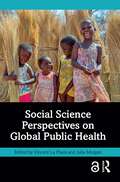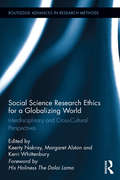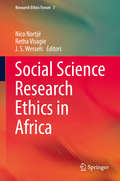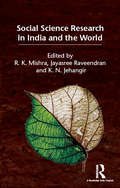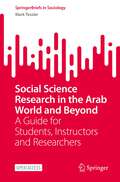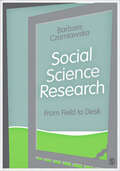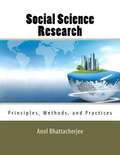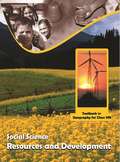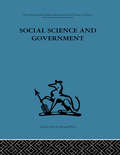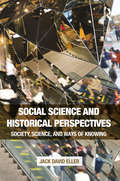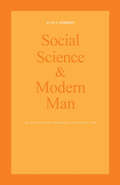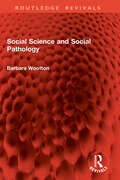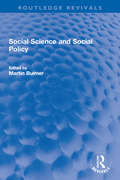- Table View
- List View
Social Science Part-2 class 9 - Karnataka Board
by Karnataka Textbook SocietyThe Karnataka Government 9th Social Studies Part 2 syllabus covers History, Political Science, Sociology, Geography, Economics, and Business Studies. It aims to help students understand the state's past, present, and future. Students will learn about the major events and personalities in history, the physical features and climate of the state, its economy, government, and culture. It helps the students develop critical thinking skills and the ability to analyze information. The syllabus is comprehensive, also a valuable resource for students who are interested in History, Political Science, Sociology, Geography, Economics, and Business Studies.
Social Science Perspectives on Global Public Health
by Vincent La Placa Julia MorganApproaching global health through a social justice lens, this text explores both established and emerging issues for contemporary health and wellbeing. Divided into two parts, the book introduces key concepts in relation to global public health, such as ethics, economics, health disparities, and globalisation. The second part comprises chapters exploring specific challenges, such as designing and implementing public health interventions, the role of social enterprise, climate change, sustainability and health, oral health, violence, palliative care, mental health, loneliness, nutrition, and embracing diverse genders. These chapters build on, and apply, the theoretical frameworks laid out in part one, linking the substantive content to broader contexts. Taking an inclusive, global approach, this is a key text for both undergraduate and postgraduate students of global health, public health, and medical sociology.
Social Science Research Ethics for a Globalizing World: Interdisciplinary and Cross-Cultural Perspectives (Routledge Advances in Research Methods #16)
by Kerri Whittenbury Margaret Alston Keerty NakrayResearch in the humanities and social sciences thrives on critical reflections that unfold with each research project, not only in terms of knowledge created, but in whether chosen methodologies served their purpose. Ethics forms the bulwark of any social science research methodology and it requires continuous engagement and reengagement for the greater advancement of knowledge. Each chapter in this book will draw from the empirical knowledge created through intensive fieldwork and provide an account of ethical questions faced by the contributors, placing them in the context of contemporary debates surrounding the theory and practice of ethics. The chapters have been thematically organized into five sections: Feminist Ethics: Cross-Cultural Reflections and Its Implications for Change; Researching Physical and Sexual Violence in Non-Academic Settings: A Need for Ethical Protocols; Human Agency, Reciprocity, Participation and Activism: Meanings for Social Science Research Ethics; Emotions, Conflict and Dangerous Fields: Issues of “Safety” and Reflective Research; and Social Science Education: Training in Ethics or “Ethical Training” and “Ethical Publicizing." This inter-disciplinary volume will interest students and researchers in academic and non-academic settings in core disciplines of Anthropology, Sociology, Law, Political Science, International Relations, Geography, or inter-disciplinary degrees in Development Studies, Health Studies, Public Health Policy, Social Policy, Health Policy, Psychology, Peace and Conflict studies, and Gender Studies. The book features a foreword by His Holiness The Dalai Lama.
Social Science Research Ethics in Africa (Research Ethics Forum #7)
by Nico Nortjé Retha Visagie J. S. WesselsThis book gives a voice to debates surrounding social science research ethics in Africa and brings them together in a coherent form to assist readers in being at the forefront of the discussions. The book gives an overview of the importance of research ethics in social sciences, as well as articulating the African influence on the subject matter. Subsequently it looks into specific frameworks and tools that researchers can apply in the process of doing research. Last but not least it also takes an in-depth look at traditional ethical issues pertaining to research in social sciences, through the lens of the African continent. This is the first book on social science research ethics in an African context and an indispensable resource for researchers, students, policy makers and research institutions in or interested in African research ethics.
Social Science Research in India and the World
by R. K. Mishra Jayasree Raveendran K. N. JehangirA unique and comprehensive study on social science research, this book highlights the status, issues, roadblocks and challenges of the field in India and certain select nations of the world. It conducts key cross-comparisons with existing literature in the area, and discusses aid policies and decisions, funding dynamics and quality of research as well as assessment systems in social science research.
Social Science Research in the Arab World and Beyond: A Guide for Students, Instructors and Researchers (SpringerBriefs in Sociology)
by Mark TesslerThis book presents and discusses the logic and method of social science research adapted mainly for instruction at Arab universities and for research in Arab countries, but with applicability beyond the region. It illustrates major concepts and methods pertaining to research with examples of previous studies carried out in the Arab world and with exercises using Arab Barometer and other datasets. The book situates itself between a regular methods textbook and an annotated list of major concepts and methods, and includes an introduction, three chapters, and four appendices.
Social Science Research: From Field to Desk
by Barbara CzarniawskaThis clear, straightforward textbook embraces the practical reality of actually doing fieldwork. It tackles the common problems faced by new researchers head on, offering sensible advice and instructive case studies from the author’s own experience. Barbara Czarniawska takes us on a master class through the research process, encouraging us to revisit the various facets of the fieldwork research and helping us to reframe our own experiences. Combining a conversational style of writing with an impressive range of empirical examples she takes the reader from planning and designing research to collecting and analyzing data all the way to writing up and disseminating findings. This is a sophisticated introduction to a broad range of research methods and methodologies; it will be of great interest to anyone keen to revisit social research in the company of an expert guide.
Social Science Research: Principles, Methods, and Practices (2nd Edition)
by Anol BhattacherjeeThis book is designed to introduce doctoral and graduate students to the process of conducting scientific research in the social sciences, business, education, public health, and related disciplines. It is a one-stop, comprehensive, and compact source for foundational concepts in behavioral research. A supplement to research readings in any doctoral seminar or research methods class.
Social Science Resources and Development class 8 - NCERT
by National Council of Educational Research and TrainingIdeal for the students of Class 8, this Resources and Development Textbook in Geography is based on the guidelines outlined by the CBSE board. It has been written in a simple language so that the candidates are able to grasp the concept of the topics covered in the syllabus. This textbook is published by NCERT. The book has colourful pictures that not only make it interesting for the students to study but also help them to have a better understanding of the environment and nature.
Social Science Term-1 Volume-3 class 7 - Tamil Nadu Board
by Government of Tamil NaduTextbook of Social Science for the students of class 7 of Tamil Nadu Board.
Social Science Term-1 class 4 - Tamil Nadu Board
by State Council of Educational Research and Training Tamil Naduஇந்த புத்தகத்தில் மூவேந்த அரசர்கள், பல நில அமைப்புகள், நகராட்சி மற்றும் மாநகராட்சி அதன் அலுவலகங்கள் மற்றும் பணியாளர்கள் முதலியவை பற்றி அறிந்துகொள்ளலாம்.
Social Science Term-1 class 6 - Tamil Nadu Board 2024: சமூக அறிவியல் ஆறாம் வகுப்பு முதல் பருவம்
by State Council of Educational Research and Training Tamil Naduஇப்புத்தகம் தமிழ்நாடு பாடத்திட்டத்தின் கீழ் 6 ஆம் வகுப்பு மாணவர்களுக்கான சமூக அறிவியல் பாடநூலாகும். இது முதல் பருவத்திற்கான வரலாறு, புவியியல், மற்றும் குடிமையியல் ஆகிய பகுதிகளை உள்ளடக்கியது. வரலாற்றில் சிந்துவெளி நாகரிகம், பழந்தமிழர் வாழ்வியல் போன்ற தலைப்புகள் உள்ளன. புவியியலில் புவி மாதிரி, நிலப்பரப்புகள் குறித்து விவரிக்கப்பட்டுள்ளது. குடிமையியலில் பன்முகத்தன்மை, சமத்துவம் போன்ற சமூகக் கருத்துகள் அறிமுகப்படுத்தப்பட்டுள்ளன. மாணவர்கள் தங்கள் சுற்றுப்புறம் மற்றும் சமூகத்தைப் புரிந்துகொள்ள உதவும் வகையில் எளிய நடையில் தகவல்கள் வழங்கப்பட்டுள்ளன. தேர்வுக்கான அடிப்படைக் கருத்துக்களை வலுப்படுத்தும் நோக்கில் இப்புத்தகம் வடிவமைக்கப்பட்டுள்ளது.
Social Science Term-2 class 4 - Tamil Nadu Board: சமூக அறிவியல் நான்காம் வகுப்பு இரண்டாம் பருவம் தொகுதி - 2
by State Council of Educational Research and Training Tamil Naduஇந்த புத்தகத்தில் சங்ககால வள்ளல்கள், பல்வேறு போக்குவரத்துகள், தமிழ்நாட்டின் இயற்கை அமைப்பு மற்றும் அதன் கோவில்கள் காணப்படுகிறது.
Social Science Term-3 class 4 - Tamil Nadu Board: சமூக அறிவியல் நான்காம் வகுப்பு மூன்றாம் பருவம் தொகுதி - 2
by State Council of Educational Research and Training Tamil Naduஉலகமெல்லாம் உள்ள தமிழர்கள். இலங்கை, மலேசியா, சிங்கப்பூர், பிஜி, மியான்மர், மொரிஷியஸ், ரியூனியன் ஆகியவையில் தமிழர்களின் சில கோவில்கள் மற்றும் ரூபாய் நோட்டுகள் காணப்படுகின்றது. சென்னை மாகாணத்தின் வரலாறு மற்றும் மண்டலங்கள் குறிப்பிடப்பட்டுள்ளது. குழந்தைகளின் உரிமைகள் மற்றும் கடமைகள் இதில் கூறப்பட்டுள்ளது.
Social Science Term-3 class 5 - Tamil Nadu Board
by State Council of Educational Research and Training Tamil NaduIn this book we will learn about Forts and Palaces, Agriculture and Educational Rights.
Social Science and Government: Policies and problems (International Behavioural And Social Sciences Ser. #Vol. 104)
by A B Cherns R Sinclair W I JenkinsTavistock Press was established as a co-operative venture between the Tavistock Institute and Routledge & Kegan Paul (RKP) in the 1950s to produce a series of major contributions across the social sciences. This volume is part of a 2001 reissue of a selection of those important works which have since gone out of print, or are difficult to locate. Published by Routledge, 112 volumes in total are being brought together under the name The International Behavioural and Social Sciences Library: Classics from the Tavistock Press. Reproduced here in facsimile, this volume was originally published in 1972 and is available individually. The collection is also available in a number of themed mini-sets of between 5 and 13 volumes, or as a complete collection.
Social Science and Historical Perspectives: Society, Science, and Ways of Knowing
by Jack David EllerThis accessible book introduces the story of ‘social science’, with coverage of history, politics, economics, sociology, psychology, anthropology, and geography. Key questions include: How and why did the social sciences originate and differentiate? How are they related to older traditions that have defined Western civilization? What is the unique perspective or ‘way of knowing’ of each social science? What are the challenges—and alternatives—to the social sciences as they stand in the twenty-first century? Eller explains the origin, evolution, methods, and the main figures, literature, concepts, and theories in each discipline. The chapters also feature a range of contemporary examples, with consideration given to how the disciplines address present-day issues.
Social Science and Modern Man: Alan B. Plaunt Memorial Lectures 1969
by Scott GordonThe main theme of these lectures is man's struggle to understand himself as a social being. The author argues that the chief inspiration for this effort, insofar as it has been successful, has been the rationalist philosophy of physical science, and that constructive social science has been based on this philosophy rather than upon theology and ethical philosophy. He goes on to discuss the major problems confronting man in his attempts to come to grips with the modern social world - problems of social and political organization, of equality and aspiration, of intellect and reason - and ends with a plea for liberalism and rationalism as the political and intellectual foundations of freedom and progress. This fascinating and thought-provoking apology for liberalism and the social scientist will be valuable reading for anyone interested in problems facing them both today.
Social Science and Social Pathology (Routledge Revivals)
by Barbara WoottonOriginally published in 1959, this book critically examines, in the light of numerous research, both the relation between unacceptable behaviour and economic and social status and the validity of several popular hypotheses of the 20th Century: that anti-social attitudes are due to lack of maternal affection in infancy, or that problem families produce problem families generation after generation. The author discusses the factors affecting the growth of modern psychiatry and how this shaped attitudes towards anti-social behaviour and conceptions of social work. The final section of the book considers the wider methodological implications.
Social Science and Social Policy (Routledge Revivals)
by Martin BulmerFirst published in 1986, Social Science and Social Policy addresses major questions concerned with the social utility of social science. The book is divided into four parts. The first part considers the place of social science in the policy-making process and criticizes the rational model which gives a central place to analysis. In part two, five different methodologies for policy research are considered: the use of continuous surveys, public opinion polls, social indicators, evaluation research and social experimentations and the use of qualitative methods. The advantages and drawbacks of each are considered with extensive use of examples. In the third part, the role of theory is examined. Particular attention is paid to the issue of health inequality. In part four, general questions are raised about the use and abuse of social science, including questions about how it can be most effectively disseminated to make maximum impact. The book is aimed at a general readership and requires no special methodological expertise. It will appeal particularly to undergraduates and graduate students taking courses in social policy, public policy applied sociology and a range of applied social sciences such as criminology, health studies, education and social work.
Social Science class 10 - Karnataka Board: ಸಮಾಜ ವಿಜ್ಞಾನ 10 ನೇ ತರಗತಿ - ಕರ್ನಾಟಕ ಮಂಡಳಿ
by Karnataka Patyapusthaka Sangha - karnataka boardSocial Science text book for 10th standard kannada medium, Karnataka Sate
Social Science class 8 - Tamil Nadu Board: சமூக அறிவியல் எட்டாம் வகுப்பு
by State Council of Educational Research and Training Tamil Naduதமிழ்நாடு வகுப்பு 8 சமூக அறிவியல் பாடம் புத்தகம் இந்தியா மற்றும் உலகின் வரலாறு, பொருளாதாரம், குடிமக்கள் மற்றும் இயற்கை வளங்களை பற்றிய விரிவான தகவல்களை உள்ளடக்கியுள்ளது. இதில் இந்தியாவில் ஐரோப்பிய நாடுகளின் வரலாற்று தாக்கம், இந்திய விடுதலைப் போராட்டம் மற்றும் அதன் முக்கிய நிகழ்வுகள் விளக்கப்படுகின்றன. புவியியல் பகுதிகள் நிலப்பரப்பின் அமைப்பு, வளங்கள் மற்றும் வேளாண்மையின் முக்கியத்துவத்தை பற்றி விவரிக்கின்றன. அரசியலியல் மற்றும் அரசின் செயல்பாடுகள், இந்திய அரசியலமைப்பின் முக்கியத்துவம், மக்களின் உரிமைகள் மற்றும் கடமைகளும் இந்தப் புத்தகத்தில் உள்ளன. பொருளாதாரம், உலகளாவிய வேக மாற்றங்கள் மற்றும் இந்திய பொருளாதாரத்தில் பணம் மற்றும் கடன் அமைப்புகள் பற்றி மாணவர்களுக்கு விளக்கம் அளிக்கப்படுகிறது
Social Science class 9 - GSTB
by Gujarat State Board of School TextbooksThe Board expresses the pleasure to publish the Textbook of Social Science for Std. 9 which is a translated version of Gujarati language.
Social Science class 9 - MP Board
by Madhya Pradesh Rajya Shiksha Kendra BhopalThis is the Social Science 9th standard book from Madhya pradesh rajya shikha kendra bhopal
Social Science class 9 - Tamil Nadu Board
by State Council of Educational Research and TrainingTextbook for social science for the students of class 9.

